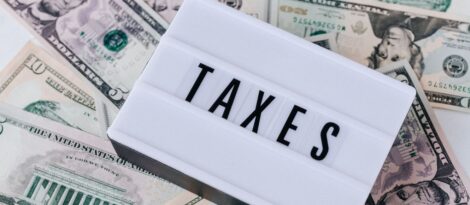If something seems too good to be true, it is. Never let anyone on your computer, and always keep your banking information confidential.
Protect yourself by being aware of known scams.
Scams are Everywhere
At the bank, we unfortunately see many people who fall victim to scams. Scammers are good at avoiding capture and working the financial system, and know how to manipulate victims’ emotions and goodwill to commit fraud.
Thankfully, simply being aware of scammers’ common tricks can help prevent many types of identity theft.
Here are a few common signs or warnings that you are being scammed:
- An online friend asks for your online banking or mobile banking credentials so they can make a deposit or transfer for you – never give out your access credentials!
- You are a winner, but you have to pay taxes first – taxes are deducted from winnings, you don’t pay them in first!
- Anyone that you meet online needs a favor – scammers will communicate for months just to trick you into doing them a favor that will cost you money!
- Any online request for you to purchase gift cards is a scam!
- Anytime you receive a check or deposit and are asked to return or forward any part of it, you are being scammed! – That check or deposit will bounce, costing you the amount you returned.
Scammers will typically use one of the following excuses for contacting you, often relying on a sense of urgency to push you into giving them information or money:
- You have a technical problem such as a computer virus.
- They threaten you with an unpaid debt such as taxes due or a past due invoice.
- They appeal to your soft side as a “friend” in need of assistance.
- They offer you a way to make some easy money.
- They pretend to be a relative in need of money.
If you find yourself a victim of fraud or have given out any information including credit card or account information or your Social Security Number, contact your banking institution immediately. You will likely be advised to contact a credit bureau directly to put out an initial fraud alert, extended fraud alert or credit freeze.
Below are some examples of scams. For more information about fraud and ID theft protection, review our Fraud and ID Protection resource.
Known Scams in Our Area
Home Warranty Letter
If you have a mortgage, you may receive a mailed letter designed to appear as a FINAL NOTICE that a home warranty may be expired or is already expired. What makes this letter so convincing is that it will typically contain the bank or lender name that the homeowner’s mortgage is secured by.
Rest assured; Dieterich Bank does not sell our customers’ information. Mortgage documents are public information at the courthouse, and they state the owner’s name, address, and the lender involved. This makes the letter appear legitimate, but often times you may notice in small print at the bottom of the page a disclaimer stating, “We are not affiliated with your current mortgage holder.”
Dieterich Bank does not sell home warranties. Home warranties are a form of insurance, so if you’re interested in purchasing a home warranty, you may want to discuss with your home insurance provider. Always be careful in providing any personal information to companies you are not familiar with, as it might be a scam.
Merchant Scams
Some scammers will call their victims, claiming to work for a merchant or online retailer (i.e. Amazon, etc.). The caller may claim the victim’s account or profile has been hacked so they need to verify the credit card or payment information that is saved on the account. If you receive a call from a merchant it is likely to be a scam. Merchants rarely call customers and they will never ask for specific account or payment information.
Gift Cards
We have been made aware of recent fraud reports involving gift cards. Scammers frequently use gift cards because it is easy to share gift card numbers, and the money on the gift card can be used immediately and is difficult to track. If anyone demands or prefers payment by gift card, this is most likely a scam.
For more information about gift card scams and what to do when scammed out of money by this trick, visit the Federal Trade Commission Consumer Information page at ftc.gov/giftcards.
Facebook Marketplace and Online Buying
Facebook Marketplace, Craigslist, and other online buying platforms are known places for scammers to operate. Some fraudulent activity on these sites includes collecting payment without delivering the purchased product and selling fake or knock off products. It can be extremely difficult to get your lost money back from transactions on these sites. When buying products online, always use caution and discretion.
Phone Scams
Scammers pretending to be various types of law enforcement or government officials may threaten arrest, fines, closing accounts, lawsuits, etc. to the person receiving the call, unless he or she can verify their Social Security Number or account number. This is all a ruse to get a person flustered and more likely to give up their Social Security Number or account number in order to clear up the issue.
When identifying a scammer on the phone, the key is remaining calm. If you receive such a phone call, do not provide any personal information, Social Security Number, account number, address, bank name, etc. If you’re uncertain, hang up and contact the organization directly.
IRS Tax Refund Scam
Some news channels have been reporting a new version of the IRS tax refund scam. In this version, the impostor files a false tax return (prior to the real filer filing their return) with a refund owed. The refund is direct deposited into the real taxpayer’s bank account. The impostor then contacts the taxpayer and says there was an error at the IRS and a refund was deposited to their account by error. The impostor convinces the taxpayer to return the money to their “collection agency”. They may threaten fines or jail time for refusal to cooperate.
This scam seems believable because the taxpayer was not expecting a deposit and it did indeed come from the IRS. One clue to this being a scam is that the IRS will never initiate contact by email or telephone.
Any taxpayer receiving an unexpected tax refund should contact their tax preparer or call the IRS at (800) 829-1040. The money can be returned via standard bank ACH returns as a rejected deposit. If a paper check is received, it can be marked “VOID” and returned to an IRS office.
Other Examples of Scams
Windows License Expiring
This type of scam involves a telephone call telling you your computer’s Windows software is expiring. You must call an 800 number to get it extended or your computer will stop functioning. If you respond, the scammer will send you to a website where he will be able to remote into your computer and do whatever he wants from there.
Computer virus
A phone call is received, or a pop-up appears on your computer that it is infected with a virus. When you call for assistance, the scammer has you go to a website where they can remotely access your computer. They “fix” the issue and have you log in to internet banking to make sure it works okay. They record your access ID for later use. Then they charge you a fee for fixing your computer and steal your credit card number.
Taxes are Due
Money Maker Scams
There are many variations on this. This scam can be performed by email, regular mail, or telephone.
The Job – You are offered a job as a “secret shopper” or “mystery shopper” to rate service received at a store. You are given a check or credit card to use for purchases and rate your experience. Your purchases are forwarded to your “employer”. The check you were sent bounces in a few days, or the credit card was stolen, so you wind up looking like the crook.
Help a Friend – A friend you met online recently asks you for a favor. They have a check they cannot deposit and want to forward to their family. If you could deposit it to your account and forward a MoneyGram or wire to their family, you can keep part of the funds for your trouble. They may even ask to use your mobile deposit credentials to deposit the check themselves. The check bounces in a few days, but you have already sent a MoneyGram to the scammer. You cannot get your money back.
A Relative in Trouble
This scam is usually aimed at older adults. The scammer may have researched family names and relationships. The victim receives a call from someone claiming to be a grandson, nephew, or other relative. Then they explain they have gotten into some trouble and they need money but don’t want Mom and Dad to know. Alternatively, the caller may pretend to be a policeman or attorney, and they must get paid or the relative will be going to jail or worse.
Fake Check Scams
Scammers commonly use bogus checks to send people money and then ask them to wire money or send cash back immediately, before the check clears. When the check bounces, you are the one who has to pay it back to the bank plus possible overdraft fees.
There are a few different situations where a fake check might be used. Keep an eye out for these red flags:
- You won a lottery or drawing you didn’t enter. Additionally, it is illegal in the United States to play or win earnings from a foreign lottery (US Code Title 18, Section 1953).
- You receive a check for something you sold, usually online, and the buyer claims to have sent too much and asks for money back. This is known as an overpayment scam.
- Someone asks you to deposit or cash a check for them.
- You received a check or have been asked to wire funds in connection with a deceased family member who died in a foreign country who you did not know.





